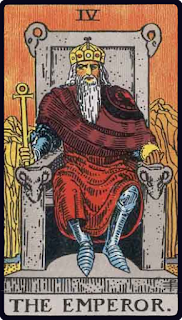
Whilst the Empress represents the maternal nature, in contrast the Emperor represents the paternal nature, as the embodiment of the Patriarchy. The Emperor represents nobility, sacrifice, leadership, and the pursuit of righteousness in the name of the collective nature over the individual nature.
Where the Empress focuses more on collective benefit, the Emperor focuses more on long-term gain, with a particular emphasis on making decisions that will ultimately benefit everyone but that those same people might not want to make, primarily because they fear the short-term loss or pain of the period of transition. It is the role of the Emperor to look beyond what people want and recognise what people need.
The Emperor is a leader and embodies the proactive nature and serves as an effective reminder not to wait for permission to make changes that you can already make, there is no authority higher than you when it comes to making decisions about your own life.
Within an empire there is no authority higher than the Emperor and this card serves as a reminder to take ownership of your authority. Ask yourself “What am I waiting for?” or “Who am I waiting for?” and “Can I do this without them?” or “How can I prepare while I wait?” as you might have no other choice but to wait for others, not out a want for permission but simply waiting for them to produce whatever you need as a foundation, in a work environment this could be an example of work-flow where you await someone else finishing their stage of development before you take over.
In the upright position The Emperor represents the choices we make that might not be of immediate benefit to us on a personal level but will benefit others and pay dividends in the long run. The Emperor is particularly associated with planning and organisation, thinking about the future and potential risks and preparing a means to mitigate those risks should they manifest.
In the inverted state The Emperor takes these concepts and reverses their focus asking us to consider the choices we are making for selfish reasons, and to consider the long-term consequences of those choices. Be prepared for unforeseen consequences as these are the situations which we will find it hardest to navigate through and provide leadership in response to both for ourselves and for others.
In the Rider-Waite deck the Emperor sits upon a stone throne framed by 4 ram’s heads, two at the top of his throne and two at his arms. The ram represents courage and strength but they also serve to depict the paternal nature as fathers of their off-spring, the young lambs, which will be sacrificed in the name of the greater good.
The Emperor holds in his hands the sceptre topped with an Ankh and an orb, together these symbolise the divine right of Kings to rule, chosen by God to lead his people within the Earthly plane. On a more personal intimate level, your life is your own dominion, our pursuit of creativity, happiness, intellect, and prosperity should not be left entirely to the mercy of others, recognise what you have the power to change, no matter how big or small that change may be, to have power and not use it is a greater failure than any attempt that falls flat - the only true failure is the failure to try.
